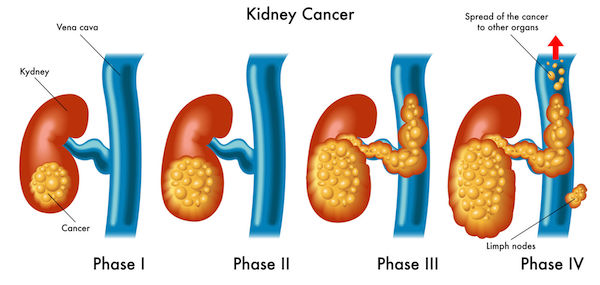Kidney cancer, also called renal cancer, is a type of cancer that originates in the kidneys.

The kidneys are two bean-shaped organs in the lower abdomen that form part of the urinary system. Kidney cancer occurs when kidney cells become abnormal or malignant and grow out of control, most often in the lining of the tiny tubules within the organ (a type of kidney cancer known as renal cell carcinoma).
Causes of kidney cancer are largely unknown but risk factors that may increase your chance of developing the disease include:
- Smoking
- Obesity
- Workplace exposure to certain chemicals
- Certain genetic or hereditary disorders, and a family history of kidney cancer
- Prolonged use of certain medications
- High blood pressure (hypertension)
- Having advanced kidney disease
- Being male.
What are its symptoms?
In the early stages of the disease, kidney cancer symptoms may not be present at all. As the disease advances, signs of kidney cancer can include:
- Blood in the urine
- A lump or mass in your side
- Persistent abdominal pain
- Unexplained weight loss
- Fatigue
- Loss of appetite
- Fever not caused by infection.
If the cancer has spread to other parts of the body, additional symptoms such as shortness of breath or bone pain may occur.
How is it diagnosed?
According to The Cancer Association of South Africa (CANSA), the majority of tumours in the kidneys are found incidentally by healthcare practitioners. Positively, in patients where tumours are picked up before they start showing symptoms, cure rates are high.
After an initial physical examination, a kidney cancer diagnosis will usually be confirmed by a blood test and urinalysis, both of which will look for kidney cancer biomarkers. Imaging tests such as ultrasound or CT and MRI scans may also be used to give doctors a better idea of the structure of the tumour.
What are your treatment options?
The mainstay of kidney cancer treatment is surgery to remove the affected kidney or the tumour. According to CANSA, the surgery most appropriate will depend on the size of the tumour and how advanced it is, whether it affects both kidneys and whether the patient has two kidneys.
Where surgery to remove it isn’t an option, cryotherapy (freezing the tumour) or radiofrequency ablation (using heat to kill the cancer cells) may be used instead.
Arterial embolization to cut off blood flow to the tumour and shrink it may also be an option, as may be biological therapy, which uses the body’s own immune system to fight the disease, or targeted therapy to slow the tumour’s growth.
Can it be prevented?
As researchers have yet to uncover the exact causes of the disease, kidney cancer prevention also remains to be better understood. At this stage, the best course of action to offset your risk of developing this type of cancer is to maintain a healthy lifestyle. This means:
- Quitting smoking
- Limiting alcohol intake
- Keeping to a healthy weight
- Taking part in regular physical activity
- Keeping blood pressure under control.
For more info
The Cancer Association of South Africa
IMAGE CREDIT: 123rf.com
